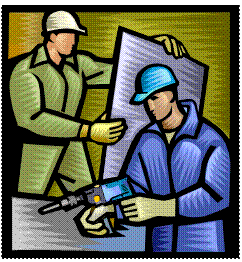Is it possible to teach your young children responsibility? Absolutely! We have all heard that it is easier to learn when we are young, so why not teach this important life skill at an early age too. Today I am going to share some tips on what we have been trying with our young children to instill responsibility in them. There are 3 areas that we are really focusing on. Responsibility in the home, responsibility for actions, and financial responsibility.
Responsibility in the Home
1) Assign Some Accountability. It is one thing to say, clean your room! Hang up your book bag! On and on and on and on. It is another thing to say, we are a team-everyone has an important role. We had a family meeting where we listed the things that have to be done around the house. The list was long and it included clearing the dishes from the table after each meal, hanging up backpacks, picking up the living room, etc. Then I asked them if they want to do it all by themselves. They of course said NO! We took the list and together assigned age appropriate chores. If it is a new task to your child, SHOW them what you want done and don’t go re-do it when they are done. Invite them to help you with your daily chores (even though it may take longer) and remember they will pick up your attitude…..so be happy when you are folding that millionth load of laundry 😉
2) Find what works and do it. A chore chart? A to do list? It may take a little time to figure it out for your family. I am a list maker, my kids see me crossing off lists every day, my 5 and 7 year old’s feel SO important when there is a to do list waiting for them after school vs my nagging voice. For the record-my nagging voice DOESN’T work! Chore charts didn’t work for us. Sometimes if we have a big cleaning day ahead of us I get all the kiddos and we walk through each room writing down what needs to be done. I break the room down into several manageable jobs for my 3-7 year old’s. For example, the living room, instead of writing clean the living room I write out: clean up books, take 10 toys to toy room, clean up coloring books, clean up crayons, etc. Then we cut up the word strips, fold them up and put them in a big bowl. Then each child gets to pull out a task, complete it, and choose another one. They LOVE this game and I LOVE watching them stack up piles of completed tasks. 🙂
3) You don’t have to do an awards system to teach responsibility. Although rewards work best for some, we personally have found at this young age that rewarding them for what is “expected of them” makes them less willing to do it AND makes them expect something for doing what they are supposed to do—they feel entitled to it. (reminder-we are a team and everyone has an important part) I don’t want my kids to feel entitled to ANYTHING! I have no problem with earning rewards for extra tasks completed, but not for what is expected of my kids. We will likely change our opinion about this when they kids are older, but for now we have set up ways to work around “rewards”.
- Set up a routine that ends with a positive result. My kids like to come cuddle with me in the morning if we have extra time. We have a routine- they need to eat breakfast, brush teeth, get dressed, double check backpack, then they can come cuddle on the couch with me (I am pregnant, still have morning sickness despite being 8 months pregnant-so I am on the couch a lot!) Cuddling on the couch is a the positive end result. Kids LOVE your time that you spend with them. That positive result gets my kiddos to focus and do their routine better than $1 would!
- When all the chores are done I usually try to let them pick one fun thing to do with me out of a list of 3 things I present to them. (Like: play barbies for 20 minutes, bake muffins, or paint toenails)
- Recognize an extra job done OR a job well done. PRAISE, praise, praise. The occasional doughnut run or treat is unexpected and gets them excited that they were helpful—but they didn’t feel entitled to it.
Responsibility for Actions
No parent likes to see their child in a tough situation, and often we do what we can to remove them from it. (I AM SO GUILTY!) Unfortunately we aren’t always going to be there to “fix the situation”. So we can start when they are little to help them learn that they can make the choice, but you can’t choose the consequence, in other words, responsibility for their actions. It is so hard and not fun to be “That MOM” who doesn’t take your kid’s shoes that they forgot at home or their homework, BUT the benefit of this is the consequences usually aren’t as horrible when they are young. Accepting responsibility is hard–I am still practicing this myself!
I was in this situation just last week when my 7 year old called from school hysterically crying. She had borrowed a book from the classroom library 6 MONTHS ago and it hadn’t been returned. If she didn’t return it the next day she wouldn’t be allowed to go on the really cool end of the school year field trip. My very first thought was “Oh my word, why did the teacher wait until 12 hours before the “big trip” to tell me instead of 6 months ago!” (see even I am still working on this!) I soothed her saying I am sure we would find it when she got home. When I picked her up from school I asked her who was responsible for the situation she was in. She replied, “It was not my fault, it was the substitute teacher, or the classroom librarian’s fault, or maybe it was the lunch lady’s fault….” She seriously blamed 7 people before it finally came around to she was responsible for the book and it wasn’t where it was supposed to be. Once we got through that part, we walked into her classroom library and found the book placed in the wrong place. It was there the whole time, she had turned it into a substitute teacher who put it away wrong. It was a fantastic lesson on accepting responsibility for her actions. The only way your children can learn to make good choices is by practice and accepting the result.
While they are young we can let them make their own decisions:
- Even the littlest children can be given 2 options, explained the goods and bad’s and then choose for themselves.
- When they choose the not best choice, try your very hardest to NOT fix the consequence.
- This will help them learn faster and take responsibility for their actions
- This also gives them independence
- Create a learning environment in your home where they can learn and mess up a little.
With all that said, don’t leave them hanging, they are little after all! Guide them through choices-pointing out possible scenarios-listen, guide, but let them practice making choices. Be there to give lots of hugs when they are suffering consequences. You aren’t a bad Mom if you don’t rush your child’s folder/shoes/gym bag to school if they forget it. There is a really good chance it will be a long while before they forget it again because they had to deal with it that day. At this young age the consequences aren’t HORRID, the decisions aren’t big, training them now will help for when the choices are huge!
Financial Responsibility
Above I mentioned we don’t do allowance or financial rewards for our young children yet, so how do I teach them financial responsibility? Children don’t have to have their own money to teach finical responsibility. Children often times don’t understand where the money comes from because it has never been explained
- Hold a family meeting and talk about WHO has to to WHAT to earn money
- Talk about necessary expenses-house, food, heat, gas, water, etc.
- Then break it down into amount of hours of work needed to pay for each item
For EXAMPLE: Dad works full time for our family, I mostly stay at home, but do drive a school bus and take our kids with me each route (about an hour each morning and afternoon). We all agreed that having a house was VERY important, then we broke it down into how many hours Dad has to work to pay for our house each month. I told them it takes 44 hours of Dad’s work to pay for our house each month. To them that sounded like a lot but to really help them understand, I told them that would be like us driving 44 bus routes in a row to pay for it. THEY GASPED they truly understood the value of work vs. money.
This also worked with turning off lights, not leaving the water running, wasting electricity, etc. When they realized it would take 6 hours of Dad’s work to pay our utility bill each month they became very aware and did their best to help out!
Once they understand work hours=dollars it is easy to weed out unnecessary purchases. It is so easy for kids to see something and say, OH I want this, I want that! Often times if they want something and I will say, sure you can spend your money on it (if they have birthday money or earned it outside of the home). If their response is no, I don’t want to spend mine, then I say, I don’t want to spend ours either, maybe this isn’t something we NEED? If they do NEED it, help them figure a way to earn the money vs just giving it to them.
Teaching kids responsibility isn’t easy—but what part of parenting is?
As much as we’d love our young children to always obey, listen and be responsible, realistically it isn’t going to happen! Teaching responsibility is all about love, patience and consistency. Remember, they are just little. They aren’t going to get it right the first time every time. Be patient, help them out by not always saving the day but find a good balance and don’t leave them hanging! Hope you found some helpful ideas for your family! Let me know what works for you! I’d love to hear your tips!
- A VIVO Mask Will Complete Your Costume! - 10/18/2019
- 10 easy tips to make beautiful pies! - 07/09/2019
- 10 Boredom Busters for Summer Break! - 05/28/2019






Great post,my kids expect me to do everything for them..My 4 year old sometimes folds clothes and put them away,I guess Its my fault for not asking them to help
these are great ideas to teach responsibility. instead of yelling and complaining that no one does what there suppose to do. it sure would make for a more harmonious home.
These are all great tips! I have my grandsons do tasks around the house like help me unload the dishwasher, help put their folded clothes away, etc.
These are some really great tips that I am definitely going to try and follow with my grandson! I wish I had of had all of these tips when I was raising my own children. They are so used to me doing everything for them, they were & are really spoiled. I wish I had of started when they were young teaching them responsibility. Thanks for sharing your tips!
rewards systems can definitely help though. I had one as a child and it encouraged me to do more around the house
1